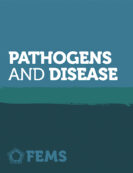FEMS Microbiology Letters Poster Prize: Vasiliki Kachrimanidou
14th meeting of the International Conference on Renewable Resources and Biorefineries 2018 (RRB2018)
The 14th meeting of the International Conference on Renewable Resources and Biorefineries took place in Ghent, Belgium on 30 May – 1 June 2018. The meeting covered topics including biobased materials, bioenergy, circular economy, downstream processing, pretreatment and transformation of lignocellulosics, sustainability, and valorization of biomass waste streams.
FEMS Microbiology Letters, in connection with the RRB Conference, awarded a prize for the best poster presentation to Vasiliki Kachrimanidou, Read an interview with Vasiliki below.
Vasiliki Kachrimanidou
What is your current position, and what was your scientific journey to get there?

I am currently working as a post-doctoral research associate in the Department of Food and Nutritional Sciences at the University of Reading under the supervision of Professor Bob Rastall, since October 2016.
I carried out my PhD in the Department of Food Science and Human Nutrition in the Agricultural University of Athens. My thesis was entitled “Microbial production of poly(hydroxyalkanoates) and biorefinery development using by-product streams from sunflower-based biodiesel production processes”, under the supervision of: Assistant Professor Apostolos Koutinas.”
Could you describe the research your poster covered?
The poster presented in the International Conference for Renewable Resources and Biorefineries (RRB14) covered the valorization of food waste for the production of bio-based pigments with the filamentous fungi Penicillium purpurogenum. Waste orange peels and waste banana skins were employed as the sole fermentation supplements during various bio-processing strategies like solid state fermentation, semi-solid state fermentation and submerged fermentation to assess pigment production.
The background of the project was based on the fact that the fermentative production of bio-based pigments is hindered by the high production cost deriving mainly from the cost of conventional raw materials. Moreover, the fungal strain Monascus purpureus, often used for pigment production, produces toxins thereof its use is restricted in Europe and the USA. Likewise, the non-toxigenic strain P. purpurogenum was chosen based on chemotaxonomic analysis to be further studied using renewable resources and/or food waste.
Overall, the poster presented some preliminary results on the valorization of food waste for pigment production, whereas the target will be to maximise pigment production through optimisation of culture conditions.”
What do you hope to focus your research on in the future?
Based on the research carried out during my PhD and later on as a post-doc I would like to develop my research on the extraction of potential prebiotics from renewable resources and evaluate their effect on gut microbiome along with other applications. Likewise, I hope to focus on the development of bioprocesses to valorise agricultural waste and by-product streams that will enable the production of a multitude of value-added products that could fit in the bioeconomy era.”
All but one of the FEMS journals are fully open access (OA), with one journal, FEMS Microbiology Letters, offering free-to-publish and OA options. Open access is key to supporting the FEMS mission of disseminating high quality research as widely as possible: when high quality, peer reviewed sound science is open access, anyone, anywhere in the world with an internet connection, can read it.







